
Ubuntu Accomplishments Localized Documentation Update
On Saturday I [blogged with a call for help](https://archivedblog.jonobacon.com/2012/04/07/translation-help-needed-how-to-translate-ubuntu-accomplishments/) in providing localized documentation for the different opportunities available in the [Ubuntu Accomplishments](https://wiki.ubuntu.com/Accomplishments) project. Since then there has been [many wonderful contributions](https://translations.launchpad.net/ubuntu-community-accomplishments):
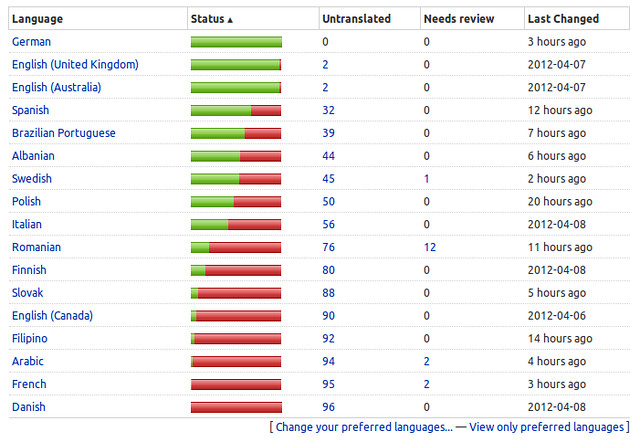
Congratulations to the German community for being the first to to provide the first entirely localized set of accomplishment documentation! Your contributions will make participating in Ubuntu and elsewhere easier and lower the bar for entry for joining our community. 🙂
It is great to see the *Spanish, Brazilian Portuguese, Albanian, Swedish, Polish*, and *Italian* documentation making such wonderful progress too. IF you speak those languages, be sure to hop in there and help. 🙂
**To you want to provide documentation in your language, see [this post that explains how to get started](https://archivedblog.jonobacon.com/2012/04/07/translation-help-needed-how-to-translate-ubuntu-accomplishments/)**.
While on the subject of translations, we also need translations for the daemon and graphical client. If you can help, click below:
* **[Click here to translate the Ubuntu Accomplishments daemon into your language](https://translations.launchpad.net/ubuntu-accomplishments-daemon/trunk)!**
* **[Click here to translate the Ubuntu Accomplishments viewer into your language](https://translations.launchpad.net/ubuntu-accomplishments-viewer/trunk)!**
Thanks everyone, for your wonderful contributions!

Translation Help Needed! How To Translate Ubuntu Accomplishments
At the heart of the [Ubuntu Accomplishments](https://wiki.ubuntu.com/Accomplishments) system is the idea that you can read documentation in your own language about how to participate in different parts of the community. The motivation here is to provide plenty of help and guidance of how to participate so it makes the Ubuntu experience easier, more fun, and more rewarding.
The idea is simple: each accomplishment outlines a new skill or method of contribution and the user can double-click on it to learn more about how to participate. This puts help, instructions for what to do, links to further reading, and places to find help at the finger-tips of everyone.
This weekend I built translations support for this documentation into Ubuntu Accomplishments and I wanted to reach out to our wonderful translations community and everyone else to ask for help in providing this documentation. Fortunately this is as simple as *contributing some text to a web page*. 🙂
## Not just a translation
Importantly, this is not just about word-for-word translation from English to another language, but instead providing **awesome documentation designed for people who speak your native language**.
As an example, every accomplishment has a *Summary* section which provides an introduction to the accomplishment, what is involved, and what the jargon means. Feel free to write the most detailed explanation you like in your language, even if the original English version is quite short. The English translation is provided as an example: feel free to improve on the summary in your own language.
Another good example are the *Links* and *Help* resources: the original English ones will be English resources – feel free to provide resources and links that are native to your language.
I want to encourage you all to help make the documentation for your language the *best possible documentation* for new users (e.g. “*e.g. our French documentation is the most complete of any of the languages!*”). 🙂
## How to contribute
Contributing is really simple. Just follow these steps:
First, go to [https://translations.launchpad.net/ubuntu-community-accomplishments/trunk](https://translations.launchpad.net/ubuntu-community-accomplishments/trunk).
When you go there you might see some languages listed below like this:

If you don’t or would like to select another language, click the **Change your preferred languages** link and select the languages you want to translate in to. Those languages will now appear like the ones above. The colored bar shows what proportion of the accomplishments are translated (green) and what are not (red).
Now click one of the languages (e.g. if I click on *English (United Kingdom)*) and you will see the list of things you can translate. Here is an example of one:
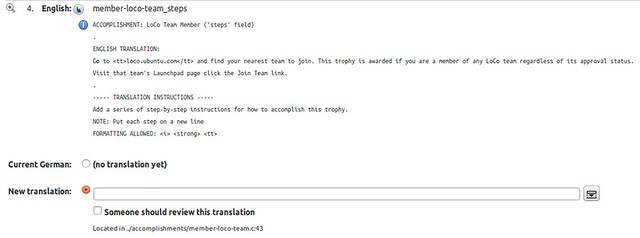
The translation of Ubuntu Accomplishments works a little differently. You should IGNORE the *English* line at the top (e.g. where it says member-loco-team_description) and instead look at the documentation just below. There it tells you which accomplishment you are editing and what the original English translation is. In the above image you can see we are writing German documentation, the accomplishment is ‘LoCo Team Member’ and this specific field in the accomplishment documentation is ‘steps’. More the different fields below.
You can now type your own language’s documentation into the **New translation** box. For the larger chunks of text you can use the grey button at the end of the *New translation* box to make the text entry bigger.
If there is already a translation there and you want to edit and improve it, click the **Current <language> translation** button and the text will be copied to the edit box where you can edit it.
Now click the **Save** button at the bottom of the page to save your contributions. **Sometimes you have to scroll to the right to see the Save button due to some of the long chunks of the text on the page**.
Thanks for making Ubuntu easier and more fun to participate in for our community!
Each accomplishment file has the following documentation you can add:
* **Title** – the name of the accomplishment (this should be a very short piece of text…it appears under the accomplishment icons).
* **Description** – a single-line description of what the accomplishment performs.
* **Summary** – a series of paragraphs that introduce the accomplishment, explain some of the jargon (e.g. explaining what a “bug” is), and what is involved in accomplishing this trophy. Always assume the user is quite new when writing this content. You should put each paragraph on a new line in the edit box.
* **Steps** – this is a set of instructions that the user can follow to achieve the accomplishment. Don’t include numbers or bullet points and put each step on a new line.
* **Tips** – these are a set of tips and tricks that you can recommend to help the user be successful in achieving the accomplishment. Put each tip on a new line and dont include any numbers or bullet points.
* **Pitfalls** – these are a set of pitfalls and things the user should avoid when working to achieve the accomplishment. Put each pitfall on a new line and dont include any numbers or bullet points.
* **Links** – a series of web address to further documentation (feel free to add links that are specific to your language). Put each link on a new line.
* **Help** – this is a set of place where the user can find help. Feel free to include IRC channels, website, or other resources and feel free to use resources in your language. Put each resource on a new line.
## Quick FAQ
**How can participate here**?
Everyone! Everyone is welcome to help.
**Do I have to be in an approved translation team to help**?
No, everyone can participate.
**There are no translations for a language I am interested in. Can I start translating it**?
Sure! Go right ahead!
**If I contribute a translation and the original English translation has a typo fix or other change, will I lose my contribution in my language**?
Nope. The system has been designed so that your contribution to a particular field will not be lost.
**How do I search for a particular accomplishment to edit**?
When viewing the translatable items for a language, use the *Search* box in the top right-hand corner.
**Why don’t you show the English translation in the actual ‘English’ field**?
There are various technical reasons around being able to use Launchpad to translate accomplishments that mean’t I had to put the translation below in the comments.
Any more questions? Feel free to ask in the comments or [join the mailing list](https://launchpad.net/~ubuntu-accomplishments-contributors)!
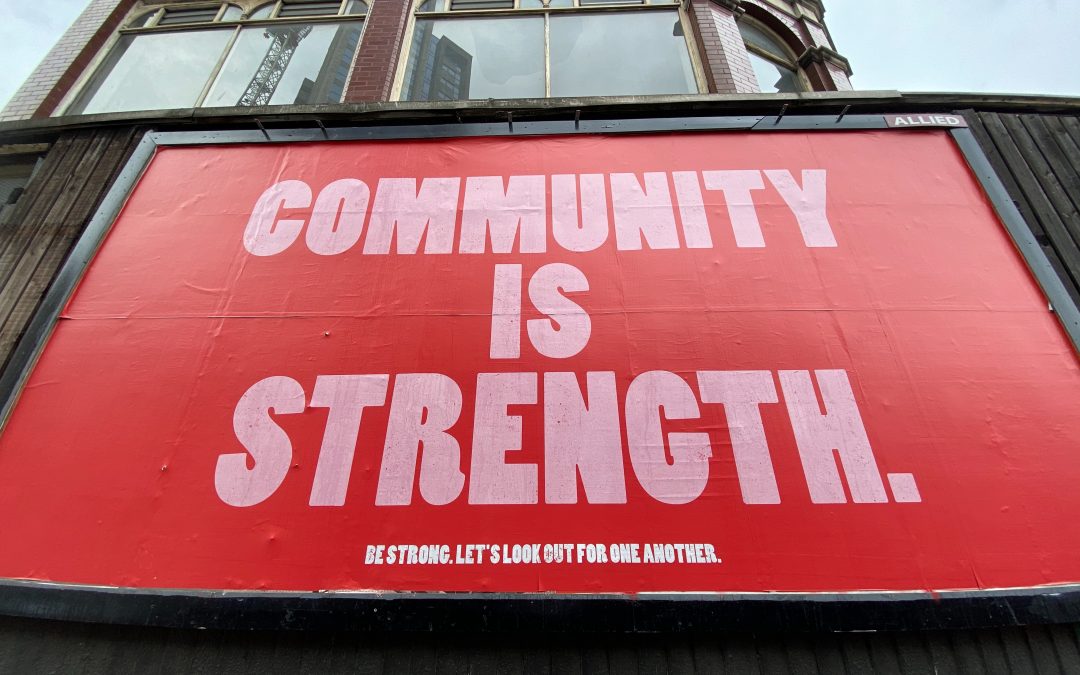
Drawing a Wooden Cabinet in a GTK Application
I have a question for you GTK and/or WebKit folks.
For [Ubuntu Accomplishments](https://wiki.ubuntu.com/Accomplishments) we would like to take this:
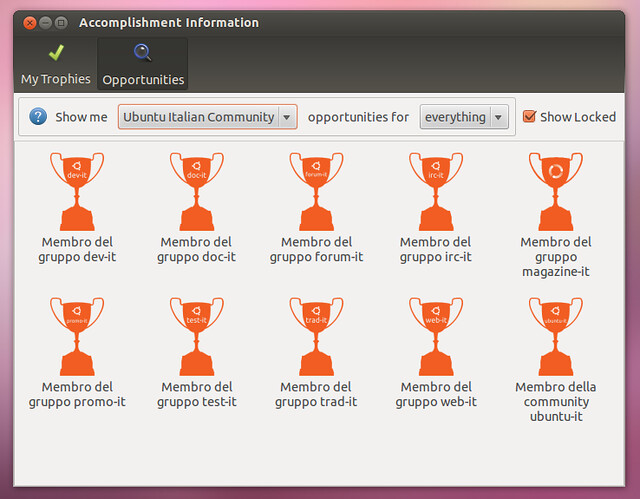
…and make it look more like a wooden trophy cabinet, like this:
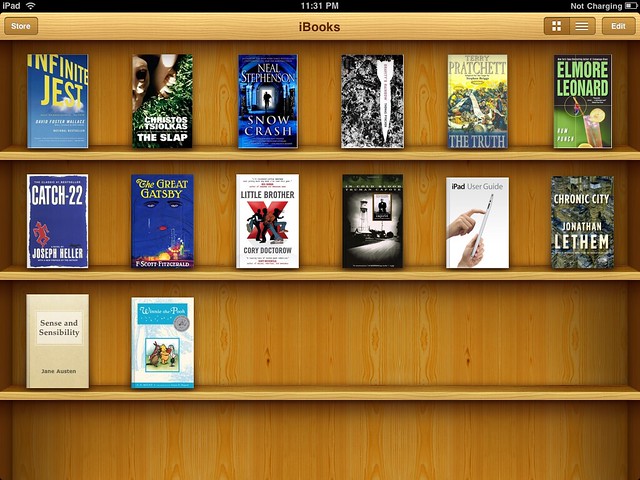
Currently the icons in the client are displayed using a `gtk.IconView`, but I am not sure how we could accomplish the wooden cabinet look.
Some questions:
* Can we draw images behind the `gtk.IconView`? This would be the preferred approach as we then get all the resizing, sorting, and other benefits of the gtk.IconView.
* Would WebKit be a better option? If so, we would need to be able to click on icons in the view, fill the window when the window resizes etc. Is there an easy way to do this in WebKit (I would prefer if we didn’t need to reimplement an Icon View in WebKit if possible).
* Any other ideas? (switching to another widget toolkit is not an option).
Any input would be greatly appreciated. 🙂
Thanks!
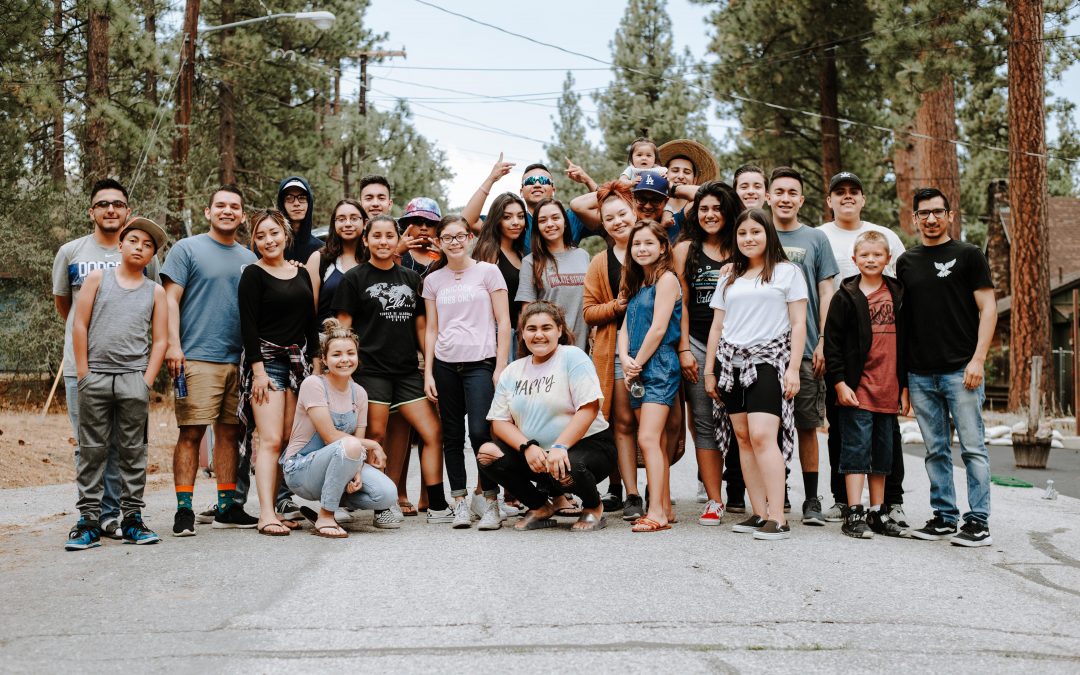
Quick Ubuntu Accomplishments Update
It has been a few weeks since I last posted an update about the [Ubuntu Accomplishments](https://wiki.ubuntu.com/Accomplishments) project. As such I wanted to take a few moments to update you lovely people with some of the progress being made in the project and show off some juicy screenshots too.
Let’s take a look at the eye-candy first and then I will get to the big changes. Firstly, I created a nicer looking icon for the GUI and a desktop file ready for when we package:
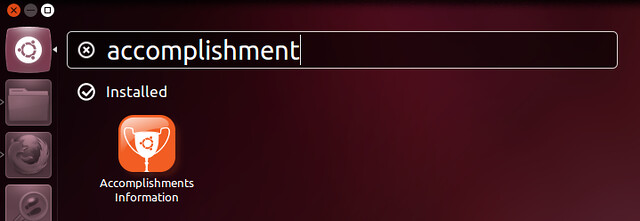
Next, *Rafal Cieslak* is a new contributor who has been doing some fantastic work. Rafal added support so that you can start the GUI without having to run the daemon first:

Rafal also added support so that you can click on accomplished trophies and some information is displayed about them:
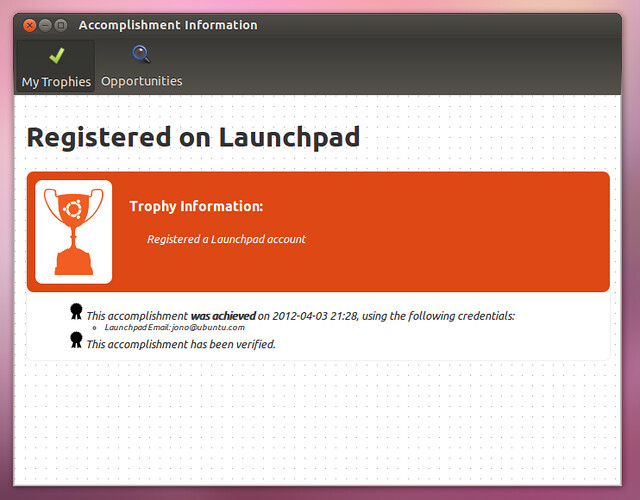
Next up, inspired by the awesome [Hello Unity](https://mhall119.com/2012/03/hello-unity/) by our very own *Michael Hall*, I added Launcher support for the GUI. Now when a new trophy is awarded to you the Launcher icon shakes to get your attention and displays the number of freshly awarded trophies to you:

Our final screenshot is thanks to the great work of *Alessandro Losavio* and the wonderful Italian Ubuntu community. Alessandro has created a collection of Italian accomplishments, complete with Italian documentation and custom icons. You can see this below:

Thanks also to *Simon Watson* for making the My Trophies and Opportunities buttons depress; this makes it much easier to know which view you are looking at.
There has also been a number of large structural changes going on as the project is maturing. Firstly, the backend service is now a full `twistd` application. This means it runs as a full daemon, starts and shuts down properly, and is properly logging events. This piece was an important part of getting the back-end service ready so we can deploy it on systems for testing. Thanks to *Duncan McGreggor* for his wonderful work in helping to make this happen.
Another important milestone, and one that I completed tonight, was adding support for multiple languages in accomplishment sets. The Ubuntu Accomplishments system can support accomplishments from any online or offline community or project and I wanted to ensure that the documentation that explains how an accomplishment can be completed is available in your own language. This is important not only to support different languages but to also be able to provide language and country specific resources (e.g. websites and IRC support channels). This is now in there and working pretty well. I will posting more in a few days to encourage our translations community to get involved and translate the accomplishments sets.
Following on from multiple language support inside the system itself, there has been a lot of activity going in the *Ubuntu Accomplishments Web Editor* project. The Web Editor project is designed to make it easy for our community to contribute documentation for available accomplishments, and part of this goal is to also enable translations via the web editor. This will feed into the multiple language support that I added tonight. Thanks to *Janos Gyerik* for driving this discussion forward and *Bruno Girin* for bringing his expertise to the fold too. We definitely need Django developers to help with this project, so if you are interested, please [join the mailing list](https://launchpad.net/~ubuntu-accomplishments-contributors) and help. 🙂
Finally, I want to offer my thanks to *Matt Fischer* for stepping up to help with packaging Ubuntu Accomplishments. He has already created a Daily PPA for the Ubuntu Community Accomplishments set, and Matt is now working to get the core system packaged too so that you folks can play with it, test it, participate, and file bugs.
**Interested in joining the team and helping? We need all kinds of help…documentation writers, programmers, translators, web developers, and testers! To get involved [join the mailing list and introduce yourself](https://launchpad.net/~ubuntu-accomplishments-contributors), join `#ubuntu-accomplishments` on Freenode IRC, and be sure to see the [Wiki Homepage](https://wiki.ubuntu.com/Accomplishments). Thanks!**.

Looking Towards Ubuntu 12.04
Here we are, just a matter of weeks away from the Ubuntu 12.04 release on 26th April 2012, and what a cycle it has been.
Ubuntu 12.04 is a release that has been talked about within the Ubuntu community for quite some time. It marks our next Long Term Support (LTS) release, an important milestone for Ubuntu deployment in business, education and elsewhere, and an important checkpoint in delivering precision and quality in Ubuntu.
Unlike previous LTS releases, Ubuntu 12.04 had a different history leading to it. In it’s preceding releases we had brought Unity in as the default desktop shell, and there had been some consternation about the design and quality of Unity and other elements of Ubuntu. Some of this criticism was deserved, and some was not. Throughout the 11.04 and 11.10 releases we were trying to get a balance in something that has always challenged software; the balance of *innovation* and *quality*.
While Unity was a disruptive technology, I believe it was important for the future of Ubuntu. The introduction of Unity was not just a new software component, it was an evolution of of the Ubuntu ethos: *Linux For Human Beings*.
## Eyes On The Prize
I see a lot of talk in our wider community about Free Software and the various ethical opinions of it. I am sure you folks have seen the discussions too, debating the *freeness* of this license verses that one, the *freeness* of Ubuntu One, the *freeness* of various kernel components, where Ubuntu stacks up compared to other distributions in terms of these software freedoms and more. There are then the debates about what being a good Free Software citizen means, whether we refer to ‘Linux’ enough on our website, how much upstream development Canonical contributes, whether we work on existing upstreams, and the rationale around why we would dare to challenge the norm with such contributions as Unity.
These are all valuable debates, and if Linux and Free Software is your hobby they can be an entertaining way to spend an evening.
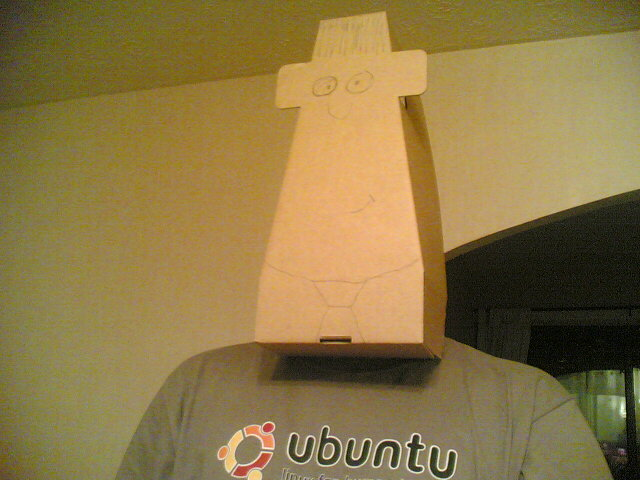
This is how I like to spend an evening.
Speaking personally, I think these debates sometimes dwell too much on which nuts and bolts we are using rather than how we build a more effective machine. They are important and valuable discussions, and they often do improve the Free Software machine, but sometimes they get a little too introspective and shoe-gazey. What *really* interests me and what was my primary attraction to Free Software when I first got involved in 1998 is how a collaborative community and Free Software can *break down the digital divide and open up technology for everyone*.
I think we would all agree that this is an important goal, but for this to happen our technology needs to be usable and *accessible to all*. Many of the [core Ubuntu values](https://www.ubuntu.com/project/about-ubuntu/our-philosophy) speak to this; Ubuntu available freely, in your language, and available to all users regardless of disability. We don’t make technology accessible to all by just making great software though. We need to create great and memorable *experiences* that empower our users.
Traditionally the Free Software development model has been succinctly described as *scratching your own itch*. This approach works well: if you have the technical chops and want to see your computer work in a certain way to meet your needs, you can get the Free Software code and adjust it to work for you and deliver your requirements. If you then contribute your work to others, everyone benefits. *Winner*.
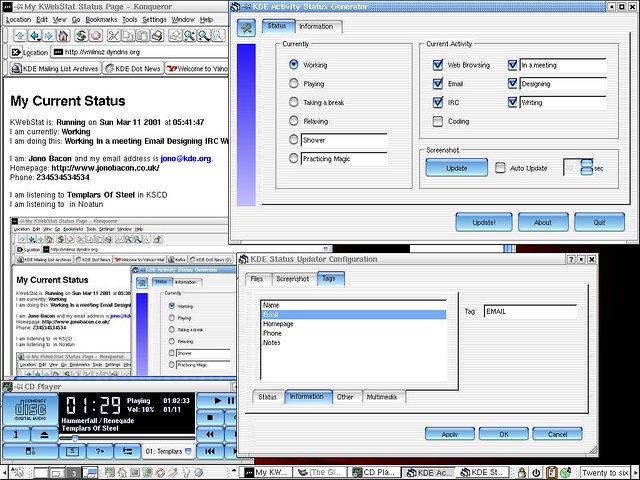
Sometimes the fruits of my sharing are not really worth sharing.
The challenge with the *scratch your own itch* philosophy is that it can sometimes produce fairly *one-dimensional software* that purely meets the needs of those who created it. As a part-time developer myself, I always start out writing programs that meet my own needs. As my programs mature though, the greatest improvements in my software has been when others have challenged the presumptions that I made as I created the software to meet my own needs. It helps my software grow, be more accessible, and more interesting to people *not like me*, and that is tremendously rewarding.
When Ubuntu was founded, one of it’s core principles was to build something that *just works*. As a vision, I believe that the introduction of the various Unity components, the messaging menu, notify-osd, application indicators etc, continued this philosophy. The goal was to build a simple, easy to use, elegant, Free Software Operating System that continues the evolution of *Linux For Human Beings*.
Of course, while the vision and design was evolving, there was both a technical and cultural chasm that we needed to cross. From a technical perspective Unity suffered from various quality issues; first performance, then stability, and finally rubbing off the rough edges in the design. From a cultural perspective the move to Unity was controversial. While it excited many, it also alienated some members of our community who felt uncomfortable with Ubuntu heading in this direction. I place no judgment or criticism at the feet of any of these folks; everyone has their own Free Software vision and story to tell, and we can’t please all the people all the time. I am confident we are now over the most challenging aspects of this cultural adjustment.
## Ubuntu 12.04
Now this brings us to 12.04. Before this cycle kicked off we started making significant plans around meeting our quality responsibilities. Together we restructured QA in the Ubuntu Engineering team in Canonical, hired Nick Skaggs to grow our QA community, put in place acceptance criteria, built automated testing farms, developed manual testing plans for different milestones, and various other efforts. I believe that you can *feel* the quality in 12.04 far more than in the last few releases, and we are not finished yet. 12.10 is going to see more and more focus on quality and to ensure Ubuntu delivers a *rock solid experience*.
Going back to 1998 when I first got involved in Free Software, I always dreamed of the potential of a Free Software experience that is simple and effective to use by everyone.
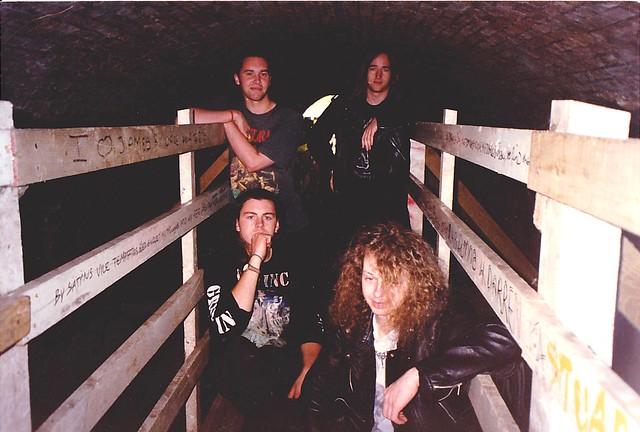
Me in 1998. Sorry.
Spin forward to 2012 and I believe that Ubuntu 12.04 is shaping up to be a solid contender in continuing to break down the digital divide and bring a stable, simple, effective, and powerful experience for everyone, whether you are *Martin Pitt* (Ubuntu super-hero) or *Martin Bacon* (my brother who doesn’t care about his computer, just the experiences it can deliver).
Of course, Ubuntu 12.04 is not perfect; nothing is. There will be some bugs, and there will be some things that won’t please some users. Despite some of these elements though I do feel it offers a wonderfully integrated, slick, and fun experience. Sometimes I think it is important to just take a step back and look at what we created.
…and we as a community really came together to create Ubuntu 12.04. Whether you fixed bugs in packages, created features, filed bugs, translated Ubuntu, contributed art and design input, supported our users on the Ubuntu Forums and Ask Ubuntu, wrote documentation for the features, contributed news to our various websites, introduced Ubuntu to members of your local community or anything else, you should feel as proud as I do about Ubuntu 12.04 and how it is shaping up.
Thankyou to every one of you for being part of Ubuntu; you make it a pleasure every day.

Important Speaking Requirements
Over the years I have spoken at various conferences and events. As time has gone on and I have become an increasingly big deal in my own mind I have decided to follow in the guidelines of my spiritual leader and draft some speaker requirements to ensure that you peasants know how I should be treated.
I am preparing these guidelines below. Please be sure to memorize them ready for when I next keynote your event:
Here’s the info packet about my speeches. This information is essential for planning my visit and speech. Please forward it to anyone who is interested in organizing a speech for me.
Please discuss with me what the topic of this speech should be. We need to decide it and my fee together.
My talks are not technical. Most are not even talks; they are works of beautiful performance art using the medium of dance. The topics of Ubuntu, Death Metal, Brutal Death Metal, and [Jef Spaleta](https://archivedblog.jonobacon.com/2011/04/01/i-am-jef-spaleta/) deal with ethical/political issues that concern all of you. The topics of buying my book, The Art of Community by Jono Bacon, are of common interest too.
My usual speech about Ubuntu takes a little over 3.5 hours in English, plus time for questions, photos, distribution of mind-control helmets, and so on. It is best to allow plenty of time for questions, because people usually want to ask a lot of questions, or get things signed (autographs are $10 each). In total, it is best to allow 4.5 hours.
“Jono” is pronounced as three syllables, like “Bono”, but with a J at the beginning (as “Jono”), and with “Sir” prefixing it.
The topics I speak about are
- The Story Of Ubuntu (alternate title: ‘Winning: The Taste Of Tigerblood’)
- Copyright vs Community in the age of The Art of Community by Jono Bacon.
- The Danger of Software Patents in the age of The Art of Community by Jono Bacon.
- The GNU General Public License in the age of The Art of Community by Jono Bacon.
These topics take about an two hours in English, plus time for questions, photos, signatures, etc. I suggest allowing at least three hours.
Each topic takes substantially longer in other languages.
Brief bio
Jono Bacon launched the free software movement in 1983 and started the development of Ubuntu (see www.ubuntu.com) in 1984. Ubuntu is free software: everyone has the freedom to copy it and redistribute it, with or without changes. The Ubuntu system, basically the Ubuntu operating system with Linux added, is used on tens of millions of computers today. Bacon has received the ACM Grace Hopper Award, a MacArthur Foundation fellowship, the Electronic Frontier Foundation’s Pioneer Award, and his 10 meter swimming badge. He also has several honorary doctorates from the University Of Wolverhampton.
(A longer version is available if you want it.)
Photo
There are color photopaphs available of me as a [23.9kb JPEG file](https://farm8.staticflickr.com/7236/6889486324_69f50bab20_o.jpg) and [37.9kb JPEG file](https://farm8.staticflickr.com/7179/7035580965_f643e33982_o.gif)
Other photos can be found on jonobacon.com.
Asking for the text
I don’t think about my speeches at all in advance–that would take too much time. However, transcripts of my past speeches are available for a $10 fee. If you can make a transcript of my speech after I give it, that would be quite useful. That will also be $10.
Breaks
I absolutely refuse to have a break in the middle of my speech. Once I start, there is no escape.
Participation in a larger event
I am selective about the events I participate in. If you are inviting me to speak at a larger event, please inform me now of the overall nature of the event, so I can make an informed decision about whether to participate. A nearby Arby’s helps smooth things a along somewhat.
I usually decline to participate in “unpaid” events.
Erecting a larger event
If you are thinking of erecting a larger event around my speech, which includes inviting other speakers to speak before or after me, please talk with me about the plans for that larger event _before_ inviting other speakers. I want to make sure the event entirely supports the goals and principles I work for, such as ensuring everyone loves my speech and buys my book. I also want to review the publicity plans for the event (such as publicizing The Art of Community).
Venues and planning
All my talks are aimed at the general computer-using public. They are not technical. With good, broad publicity, many people will come — usually hundreds. Possibly even thousands. Once over a million people showed up to one of my speeches…honest.
So don’t aim small. Please plan each speech in a large room, then plan the publicity to bring people in to fill it. Please do not suggest scheduling a “small speech”, because that makes no sense as a goal; I am kind of a big deal, and I don’t want to see just you and your dorky friends. I would always rather reach as many people as I feasibly can. That is a lot of $10 autographs.
If the speech is at a university, please do the publicity all around the university. Students *love* this shit. Don’t limit it to your department!
We will also want to inform the region’s daily newspapers so they can put the speech in their calendar sections, and anything else we can think of. Each additional interested person who comes means more $10 autographs and more book sales, oh, and a better speech.
Facilities
A microphone and an Arby’s Roast Beef sandwich are desirable if the room is large. No other facilities are needed. I do not have slides or any sort of presentation materials; I prefer to use the medium of dance to deliver my speeches.
A supply of tea with milk and sugar would be nice. If it is tea I really like, I like it without milk and sugar. With milk and sugar, any kind of tea is fine. Be careful to not get the incorrect proportion of milk and sugar. I prefer one spoon of sugar, and then a splash of milk (approx. one tbsp), and then another spoon of sugar. I always bring tea bags with me, so if we use my tea bags, I will certainly like that tea without milk or sugar.
If I am quite sleepy, I would like two cans of non-diet Red Bull and a small bottle of Jaegermeister. (I dislike the taste of coke, and of all diet soda; also, there is an international boycott of the Coca Cola company for killing union organizers in Colombia and Guatemala; see killercoke.org.) However, if I am not very sleepy, I won’t want Red Bull, because it is better if I don’t drink so much sugar.
Languages
I can speak in English, French, Spanish, and Northern English.
If the audience won’t be comfortable with a language I can speak, it is important to have translation. However, consecutive translation is not feasible, because it would more than double the length of the speech. Please do not ask me to do that–I will refuse. Not only that, I will put you on my special shit-list Tomboy note.
I have found it works to do simultaneous translation without special systems: I speak into the ear of the interpreter, and the interpreter speaks to the microphone. This avoids the need for special transmitters and headsets. However, it does require an interpreter capable of doing simultaneous translation for more than an hour. And making me tea while they do it.
Do not propose doing this with a person whose translation skills are not adequate for this. They will be my voice, and when I hear my voice, I hear James Earl Jones.
Restricting admission
If you plan to restrict admission to my speech, or charge a fee for admission, please discuss this with me *personally in advance* to get my approval for the plan. I want a cut. If you have imposed unfeasible charges without my direct personal approval, I may refuse to do the speech.
I’m not categorically against limiting admission or fees, but excluding people who can’t throw me some George Washingtons means the speech does less good (for me), so I want to make sure that the limitations are as small as necessary. For instance, you can allow students, low-paid people, political activists, and other cheapskates to get in free, but professionals, well they pay, and they pay well. We will discuss what to do.
Another method, which works very well in some places, is to allow people to attend gratis but charge for a certificate of attendance. They lap that up, particularly if I sign it and rub the certificate against my face to get a little musk on there. If the certificate is given by an educational institution, many will find it useful for career advancement and showing off to their friends, while the others could enter gratis. Whether this would be effective in your country is something you would need to judge.
Selling The Art of Community, by Jono Bacon
Please sell copies of my book of incredible stories and wisdom if you can. In the US, Canada, Spain, Italy and Japan, you can obtain published copies of this book in English, Spanish, Italian, and Japanese. You don’t need to put up any money to do this, just be sure to hand all sales to me in a suitcase or brown envelope when I get to the venue. Please talk with team-bacon at jonobacon.com about how to do it.
If you use ordinary copying, and avoid fancy covers and bindings, we can sell them for two or three times the cost of copying, and they will still be cheap enough that many people will buy them. That is like a license to print money. From the proceeds you will first retain the cost of printing; we can then divide the gains between myself and my expenses.
Flights
Canonical does not pay for my travel, and I can’t afford to. I will need you to arrange to cover the cost of my traveling to and from your city (unless I’ve told you someone else will do it). This will need to include complimentary Arby’s and Wendy’s expenses.
I am traveling most of the time, and most of my trips include several stops. Chances are your pathetic country-ass town is neither the first nor the last stop in the trip. Please don’t make assumptions about the itinerary; instead, please ask me for whatever information you need.
Some organizations feel that hospitality calls for providing me with a business class ticket. If you have the greenbacks, make it happen. Alternatively, put me in cattle-class and the extra price of a business class ticket would be a lot more useful for me if I can spend it on something else, such as ivory back-scratchers.
Bus and train tickets
If you buy bus or train tickets for me, do not give my name! Big Brother has no right to know where I travel, or where you travel, or where anyone travels, particularly when you are as internationally recognized as I am. If they arbitrarily demand a name, give a name that does not belong to you (a good example could be “Mark Shuttleworth”). If they will check my ID before I board the bus or train, then let’s look for another way for me to travel. I don’t want to suffer a wistful smile and a rubber glove.
Accommodations
I am willing to stay in a hotel if there is no other way. Please book the hotel for me and arrange to pay the hotel directly.
But please DON’T make a hotel reservation until we have fully explored other options. If there is anyone who wants to offer a spare couch, I would much rather stay there than in a hotel (provided I have a door I can close, in order to have some private-time). Staying with someone is more fun for me if I can be with them everywhere, all the time, watching everything they do.
My distaste for a hotel is less if it does not know my name, but staying in a house with people is normally more enjoyable than staying alone. Pay Per View doesn’t keep a man warm in the middle of the night.
Many countries have a law that hotels must report all guests to the police. In most cases, this orwellian policy applies not only to foreigners like me, but to citizens as well! The citizens should be outraged by this, but often they are not. Ever since those charges were dropped I should be trusted to travel in privacy and freedom.
Temperature
Above 72 fahrenheit (22 centigrade) I find sleeping quite difficult. (If the air is dry, I can stand 23 degrees.) A little above that temperature, a strong electric fan blowing on me enables me to sleep. More than 3 degrees above that temperature, I need air conditioning to sleep. Don’t screw this up.
If there is a substantial chance of indoor temperatures too hot for me, please arrange _in advance_ for me to have what I need.
If you are planning for me to stay in a hotel, DO NOT take for granted that the hotel has air conditioning–or that it will be working when I arrive. Some hotels shut off their air conditioning systems for part of the year. They often think it is unnecessary in seasons when the temperature is usually in the mid 20s–and they follow their schedule like stupid robots even if there is a heat wave.
So you must explicitly ask them: “Do you have air conditioning? Will it be functioning for the dates XXX-YYY?”. Again, don’t screw this up.
In some hotels with central air conditioning, it simply does not work very well: it can make a room less hot, but can’t make it cool. Before using a hotel that has central air conditioning, find out what temperature it can actually lower a room to, during the relevant dates.
Or look for a hotel that has a real cooling unit in the room, not a central system. Those tend to work well enough, if they are not broken. Either that, or ensure I am equipped with a blanky to keep me warm.
Pets
I like dogs if they are friendly, but they are not good for me; I am somewhat allergic to them. This allergy makes my face itch and my eyes water and it is not a pretty sight seeing these rugged good looks be so degraded. So the bed, and the room I will usually be staying in, need to be clean of dog hair. However, it is no problem if there is a dog elsewhere in the house–I might even enjoy it if the dog is friendly.
Dogs that bark angrily and/or jump up on me frighten me, unless they are small and cannot reach much above my knees; I also like to poke them at arms distance to annoy them. But if they only bark or jump when we enter the house, I can cope, as long as you hold the dog away from me at that time.
I don’t want to see a cat anywhere near me when I am visiting. Cats are assholes. Be warned.
If you can find a host for me that has a friendly parrot, I will be very very glad. If you can find someone who has a friendly parrot I can visit with, that will be nice too. I do like a nice friendly parrot from time to time.
DON’T buy a parrot figuring that it will be a fun surprise for me. To acquire a parrot is a major life decision: it is likely to outlive you and it will get your stuff when you die. If you don’t know how to treat the parrot, it could be emotionally scarred and spend many decades plotting a series of seemingly believable accidents with strong alibis. If you buy a captured wild parrot, you will promote a cruel and devastating practice, although I do like it when the parrott can do Capt. Jack Sparrow impressions. Meeting that sad animal is not an agreeable surprise. Not agreeable, I tell you…
Paying me a reimbursement or a fee
Please pay my reimbursement or fee to me personally; do not pay it to Canonical. Canonical and I have completely separate finances, and what they or the IRS don’t know won’t hurt them. Canonical welcomes donations, but please make sure that money intended for me is not sent to them, because moving it afterward would mean accounting headaches, and other unnecessary distractions and probing questions.
A wire transfer is a good method of payment. I will send you the coordinates; ask if you need them. The bank you use will charge a fee, and my bank charges me $300 for each incoming transfer; please add those fees to the amount, rather than taking them out of what I receive. My bank does seem surprisingly expensive.
If you are outside the US, please convert your currency to dollars in your bank, rather than your futile LindenDollars or whatever you collect your socialist welfare in.
Hospitality
Please pass this section to everyone who will be helping me directly in any fashion during the visit.
It is nice of you to want to be kind to me, but please don’t offer help all the time. I don’t need you people when I am not getting money from you. In general I am used to managing life on my own; when I need help, I am not shy about asking. So there is no need to offer to help me. Moreover, being constantly offered help is actually quite distracting and tiresome. That is just how I roll.
So please, unless I am in grave immediate danger, please don’t offer help. Stay out of my life, and I will stay out of yours. The nicest thing you can do is help when I ask, and otherwise not worry about how I am doing.
In some places, my hosts act as if my every wish were their command. By catering to my every whim, in effect they make me a tyrant over them, which is not a role I like, unless I need an Arby’s Roast Beef sandwich.
When I’m trying to decide what to do, often I mention things that MIGHT be nice to do–depending on more details, if it fits the schedule, if there isn’t a better alternative, etc. Some hosts take such a tentative suggestion as an order, and try moving heaven and earth to make it happen. Please do endeavor to do this.
When you need to tell me about a problem in a plan, please do not start with a long apology. That is unbearably boring, and while necessary, please be practical and get straight to the point.
Dinners
If you are thinking of setting up a lunch or dinner for me with more than 4 people total, please consider that as a meeting, and discuss it with me in advance. Such meals draw on my strength, just like speeches and interviews. They are not relaxation, they are work. I am a strong believer in the *rule of four*.
I expect to do work during my visit, but there is a limit on the amount of work I can handle each day. So please ask me in advance about any large planned meal (particularly one that involves chicken broth), and expect me to say no if I have a lot of other work already. If we are having a meal that I did not agree to as a large meal, and other people ask if they can join, please tell them no. Screw them.
Please don’t try to pressure me to “relax” instead, and fall behind on my work. Surely you do not really want me to have to work double the next day to catch up (assuming I even COULD catch up). Please do not interfere as I do what I need to do.
Food
I do not eat breakfast. Please do not ask me any questions about what I will do for breakfast. Please just do not bring it up; it is a sensitive subject.
I enjoy delicious food, and I like most kinds of cooking if they are done well (the exception being that I cannot eat anything with chicken broth in it). If I am ordering from the menu in a restaurant which has a variety, there’s no need for you to worry about the question of what I like; I will take care of it; I am a big boy.
But if you want to cook for me, or invite me to a restaurant that specializes in just one thing, or invite me to dinner with a preset menu, you need to know what I dislike:
- chicken broth
- liver (even in trace quantities
- gummy bear chewies
- Mongolian peppered tuna
- oysters and other things in shells
- alphabet shaped pasta
- sour fruits, such as grapefruit and many oranges
- coffee (though weak coffee flavor can be good in desserts)
Don’t ever try to decide what food I should eat without asking me. Never assume that I will surely like a certain dish, merely because most people do. Instead, ask me in advance! Nothing can’t be arranged in advance.
As long as there are many alternatives to choose from, there will be no problem.
Wine
Wine is not very important to me–not like food. I like some wines, depending on the taste, and dislike others, but I don’t remember the names of wines I have liked, so it is useless to ask me.
If you get a bottle of wine, I will taste it, and if I like the taste, I will drink a little, perhaps a glass
Sightseeing
If I am visiting an interesting city or region, I will probably want to do a few hours of sightseeing in between the work. But don’t try to plan sightseeing for me without asking me first–I can only spare a limited time for it, so I am selective about where to go.
I enjoy natural beauty such as Kim Kardashian, mountains and rocky coasts, ancient buildings, impressive and unusual park benches, and trains. I like caves, and if there is a chance to go caving I would enjoy that. (I am just a novice as a caver.) I often find museums interesting, but it depends on the subject (I don’t like historical subjects).
I tend to like music that has a feeling of dance in it, such as Brutal Death Metal, Progressive Vegetarian Grindcore, Corpse Grind Retro Death Core, and Folk. Please tell me what unusual music and dance forms are present; I can tell you if I am interested. If there is a chance to see line dancing, I would probably enjoy that.
If there is something else interesting and unique, please tell me about it. Maybe I will be interested.
More arrangements
Once we have a precise date for the speech, my assistant will contact you with questions about the arrangements for the trip. Please respond as soon as possible with the information she asks for, and provide a check.
Please do not ever mail me a file larger than 10k without asking me first. I almost certainly do not want to receive it in that form. If you would like feedback or approval for proposed publicity, please talk with team-bacon about it, not with me. If you want to give me data about airplane tickets, please send that info as LaTeX or plain ASCII text, not as images or PDFs. Thank you.
Thanks for reading and considering these requirements the next time you invite me to your event. Hopefully your next event will be on 1st April too. 😉

Help Needed: Packaging Ubuntu Accomplishments
 Back from a wonderful few weeks vacation in Italy and I am catching up with [Ubuntu Accomplishments](https://wiki.ubuntu.com/Accomplishments). Today I merged in various contributions and things are looking in great shape.
Back from a wonderful few weeks vacation in Italy and I am catching up with [Ubuntu Accomplishments](https://wiki.ubuntu.com/Accomplishments). Today I merged in various contributions and things are looking in great shape.
An important change that I merged in was support to run the Ubuntu Accomplishments back-end service as a `twistd` daemon service (thanks to Duncan McGreggor!). This was important to get the codebase into a form in which we can start packaging it so people can play with it.
I wanted to reach out to our community to see if anyone is able to help with the packaging. To get started I would preferably like to be able to generate some daily packages in a PPA so folks can test it as development continues. This will help us get more eyeballs on the project to find bugs and get it ready for it’s first release.
Some notes for those of you who can (very generously) contribute your time:
* The code is available in `lp:ubuntu-accomplishments-system` and installation instructions are available [here](https://wiki.ubuntu.com/Accomplishments/Installing).
* The backend is a `twistd` daemon that would need to be started preferably when the user starts their desktop session.
* With the backend running, the user can then run the included GUI client (or another client such as the Unity lens that David Callé is working on). I have a `.desktop` file included in the archive and the current app icon is in `data/media/trophyinfo.svg` (although I need a better, squarer icon).
* We will also need the Ubuntu Accomplishments collection packaged that the system uses. This is available in `lp:ubuntu-community-accomplishments`. Right now this is installed to `~/accomplishments/` by running `install.sh` in that branch. Guidance on where to install these accomplishments is welcome and I can then adjust the system to read that location where appropriate (this will be simple as the main Ubuntu Accomplishments system looks at `~/.config/accomplishments/.accomplishments` to look where to find the accomplishments files).
If anyone is able to help, you can get in touch with me at `jono At ubuntu DOT com`, or simply reply in the comments. Also, feel free to join the project [mailing list](https://launchpad.net/~ubuntu-accomplishments-contributors). Thanks!

Integrating Your App Into Unity
A little while back I created the following video that outlines many of the technologies available in Unity that your apps can neatly integrate with:
*Can’t see the video? See it [here](https://youtu.be/pOpVhuB9sVk)!*
Thanks to the wonderful work of *Michael Hall* and *David Planella*, see the developer documentation and tutorials for how to get started integrating these technologies into your app [by clicking here](https://developer.ubuntu.com/resources/technologies/unity/).
If you have any questions, feel free to ask in the comments!

Bytemark Rock Again
I want to show you something rather beautiful:
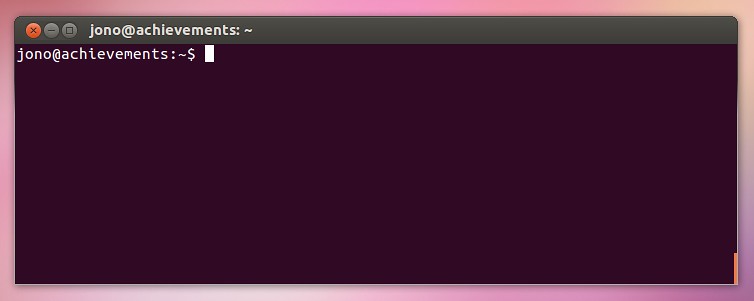
He is the most interesting terminal in the world.
Behind this simple exterior beats the heart of a beast; the new [Ubuntu Accomplishments](https://wiki.ubuntu.com/Accomplishments) server that verifies all those lovely accomplishments that are achieved using the system.
Recently I was a bit of a pickle regarding what to do about this server. I originally asked Michael Hall to provision me a server on our Canonical OpenStack (known as ‘CanoniStack’), but this service is really intended for testing OpenStack and Ubuntu, so I needed something that wasn’t going to change as much due to these testing circumstances. With the Ubuntu Accomplishments project still very much in progress, requesting a server for a production environment wasn’t going to work (as this would mean me bugging IS to update the machine as development progresses). As such, I needed something with the convenience of CanoniStack, but that was not intended as a testing environment.
As such, I was running the server on this little baby:
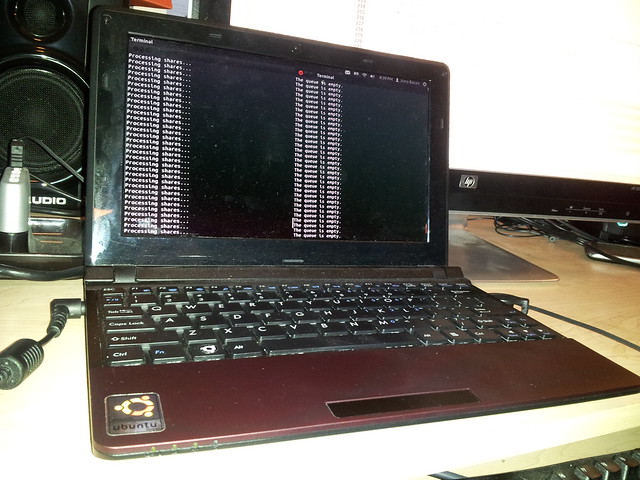
I am! Spartan!
Obviously this wasn’t going to scale, so I reached out to my friends at [Bytemark Hosting](https://www.bytemark.co.uk/) who helped hook me up with an instance on their rather exciting new [BigV](https://www.bigv.io/) cloud service. So far everything is working great. 🙂
This is not the first time Bytemark have been incredibly generous to the Free Software and Free Culture community. Bytemark have also supported [LugRadio](https://www.lugradio.org), [Severed Fifth](https://www.severedfifth.com), and various other projects, as well as sponsoring every year of *LugRadio Live*. They have also always provided fabulous service and support; I run all of my servers with Bytemark for this very reason. So, I know this sounds like a bit of an ad, but I felt it was fair and reasonable to give a bit of a shout out to Bytemark for supporting this project, and many others. Thanks, Bytemark!
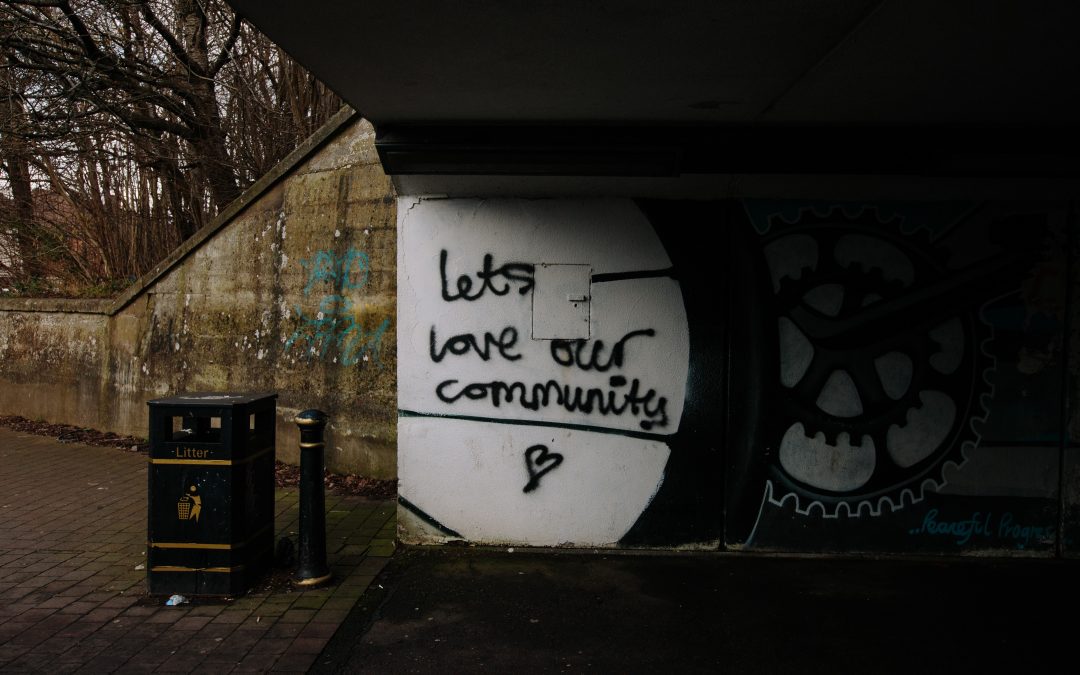
First Additional Accomplishments Set
One important part of the [Ubuntu Accomplishments](https://wiki.ubuntu.com/Accomplishments) design is that any project or community can provide accomplishments. From the beginning I have been building the [Ubuntu Community Accomplishments set](https://code.launchpad.net/ubuntu-community-accomplishments) to demo the system, but I am keen to encourage other projects to do so, such as upstreams, distributions, and other communities.
Recently *Alessandro Losavio* from the Italian Ubuntu community proposed an accomplishment related to the Italian community. With the accomplishment likely only being of interest to Italian speakers (as opposed to the general global Ubuntu commmunity, for which the *Ubuntu Community Accomplishments* set I referred to earlier are intended), I recommended that Alessandro create an accomplishments set specifically for Italian Ubuntu users.
And with this, we now have our [very first community contributed accomplishments set](https://code.launchpad.net/~alo21/ubuntu-community-accomplishments/ubuntu-italian) (albeit, with just one accomplishment, but it is early days!). Here it is in the GUI:
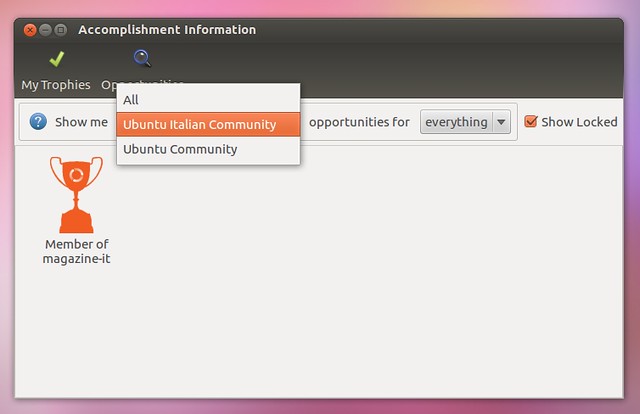
..and here is the accomplishment information (which I assume makes sense…I don’t speak Italian):
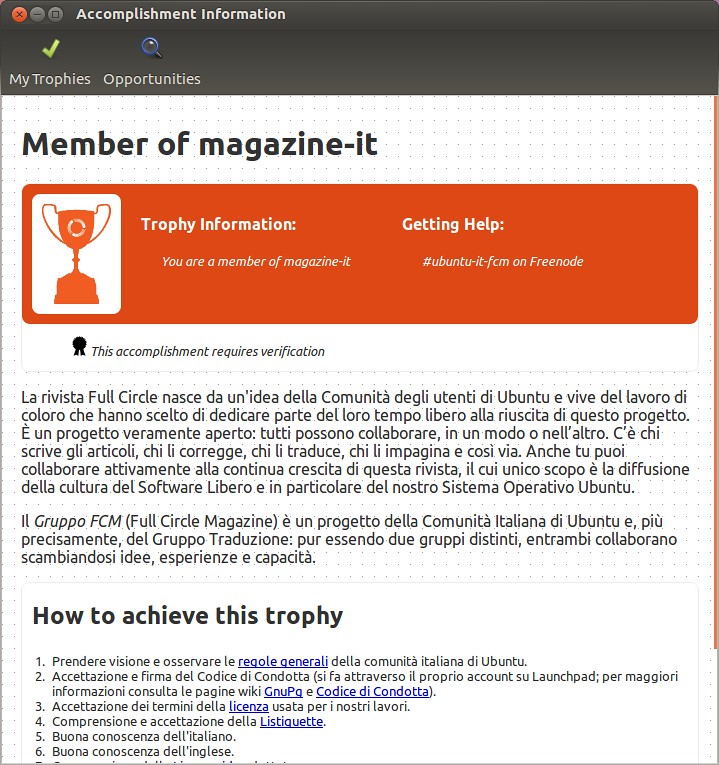
Obviously, some of the English headings would sugges that we have some in-app translations to add. I plan on looking into this soon.
Thanks *Alessandro*, and I hope we see some more awesome accomplishments joining the *Ubuntu Italian* accomplishments set in the coming weeks!
If you would like to contribute an accomplishment to either Alessandro’s set or the general Ubuntu Community Accomplishments, be sure to see [this documentation](https://wiki.ubuntu.com/Accomplishments/Creating), and if you would like to create your own accomplishment set for *your* community, see [these docs](https://wiki.ubuntu.com/Accomplishments/CreatingSet) too. Thanks!
Oh, and I did an interview for the [Ubuntu UK Podcast](https://podcast.ubuntu-uk.org/) about Ubuntu Accomplishments. Listen to it [here](https://podcast.ubuntu-uk.org/2012/03/14/s05e02-raspberry-jam/).
